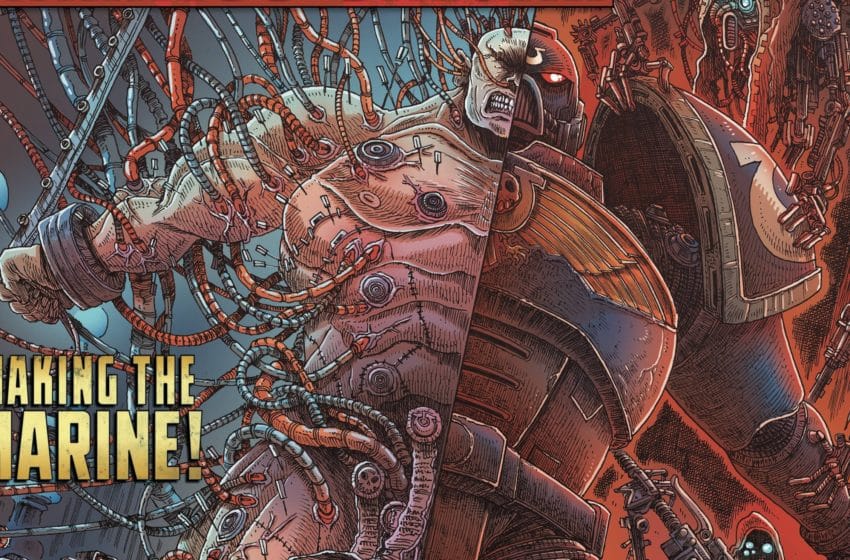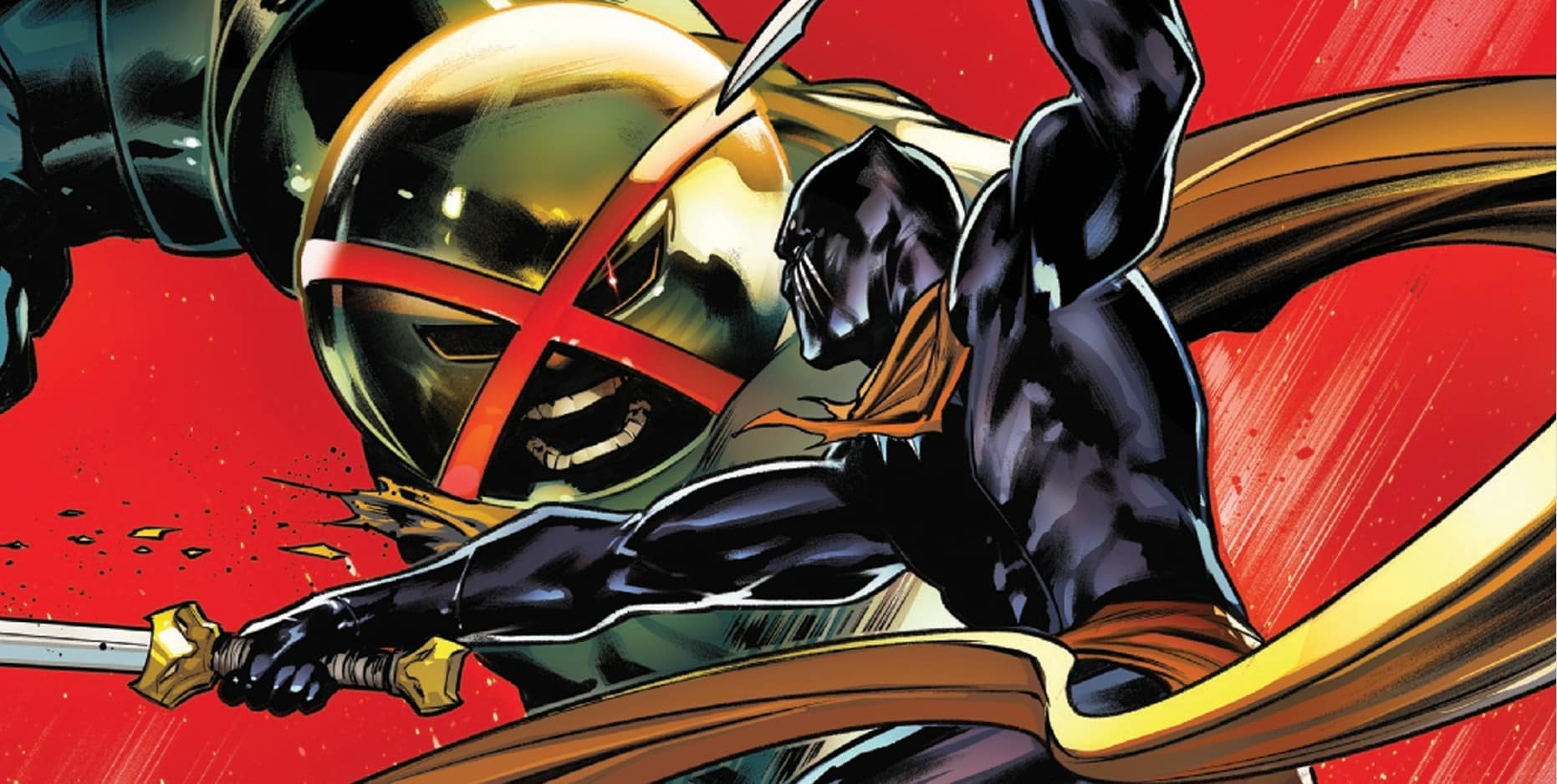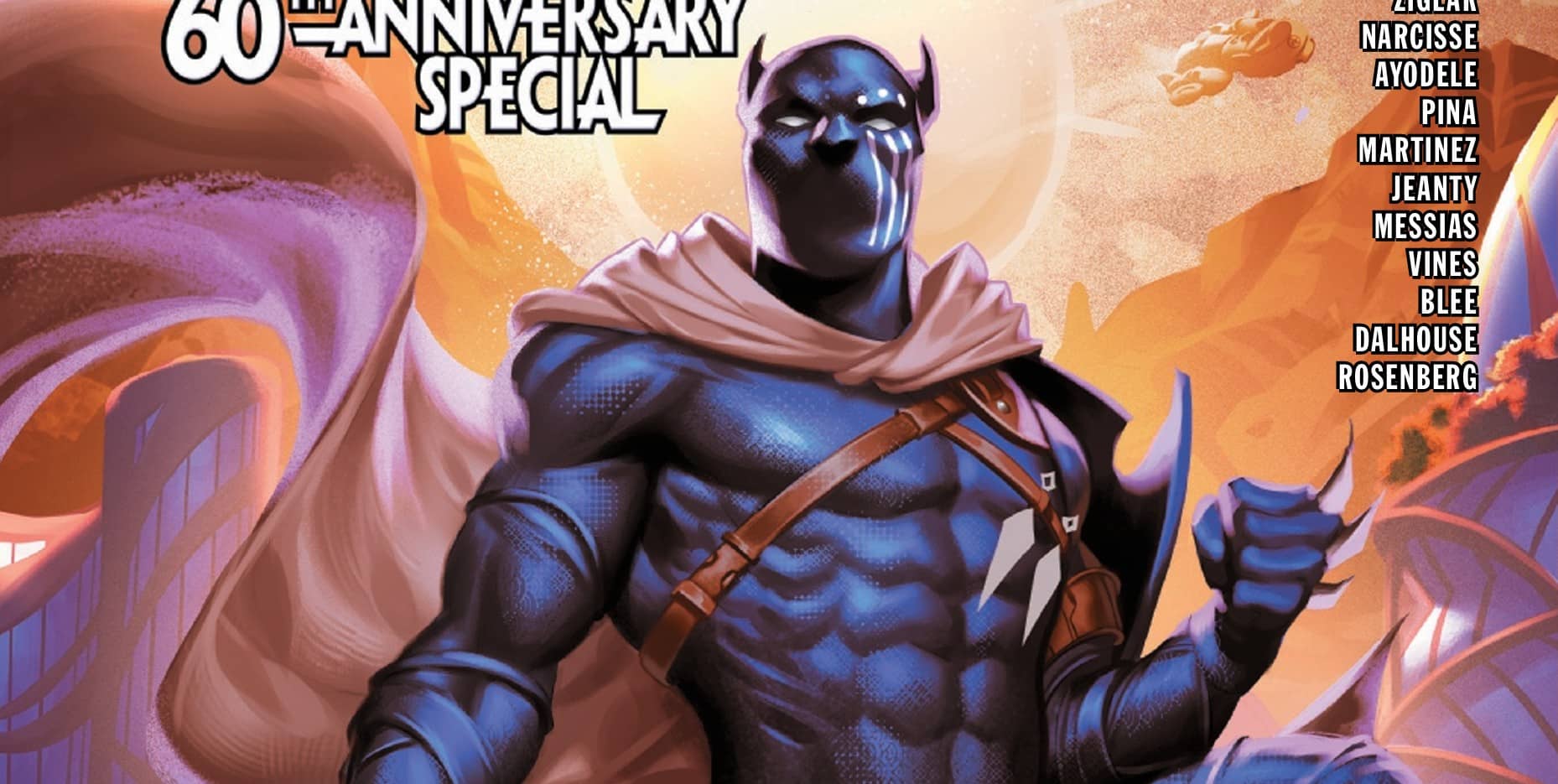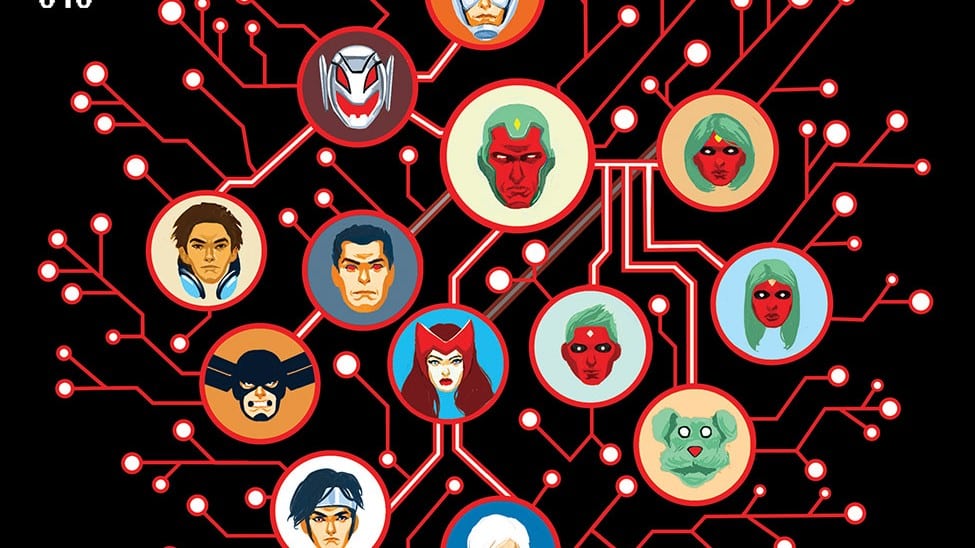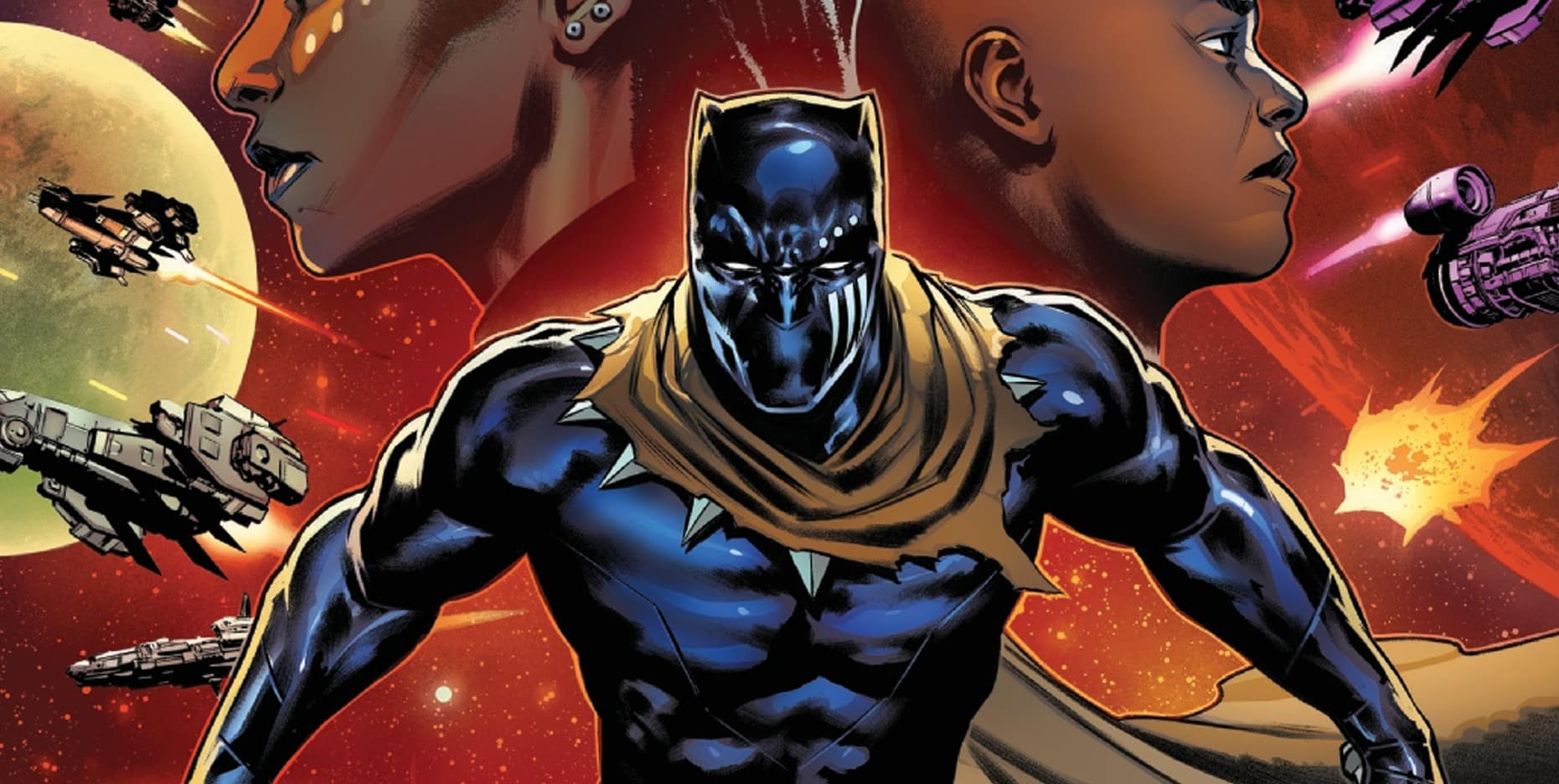Marneus finally becomes the marine his friend promised he would be in Warhammer 40K: Marneus Calgar #4 by Kieron Gillen, Jacen Burrows, Java Tartaglia, and Clayton Cowles.
Forrest Hollingsworth: Justin it’s the penultimate issue of Marneus Calgar and between the gore, heresy, inquisitorial questioning, and warrior poetry we’ve got a lot to talk about! Are you battle-ready?
Justin Partridge: O Glorious Context! O Bountiful Lore! I know it sounds like a bit by now. How every time we gather to talk about this mean, soaringly poetic, and more-than-a-little gross comic, we talk about how each issue is better than the last. But also…that doesn’t make it any less TRUE.
This fourth and penultimate issue of Marneus Calgar might be the best one yet. That is until the finale, that is. But that’s a battle for later, let’s get to the fight of NOW!
“His Hate Forged Me”

FH: Returning to the Heretical assault on the titular Calgar estate, our penultimate issue heightens both the mortal and existential stakes for the Marine in a series of scenes interspersing past and present to demonstrate exactly what made Marenus into the warrior he is. A penitent and yet remorseless soldier, his stony heart (and tank it is Warhammer after all) smashes through the walls of his borrowed family’s home to route his enemies, and as a young boy he ascends the gory path from Marine Aspirant to Neophyte (the only remaining recruit) under the ruthless auspiciousness of the Ultramarines that saved him from Crixus’ heresy.
The catch of course being that the Marines were just as, if not more, violent and demanding than Crixus was. They unleashed the very same horrors of the moon onto the recruits, they sent servitors to kill them in the night, and they seek a sacrifice of everything an aspirant was before to a more singular purpose – to kill and be killed for the God Emperor.
I for one have to say I appreciate how Gillen and the art team ensure the brutal passage of time hews close to everything the Marine’s enemies honor, to show the parallels to the fight playing out across the stars, and to show that even one as true of heart and honor as Marneus is dangerously close to playing into Chaos’ hands. There’s a spartan plainess to the poetry of the narration, to the stoicness of the imagery, the unmitigated brutality and tragedy of it all that I think is essential to the setting, but also more narrowly to Marneus’ story. For me, it’s these kind of singularly impacting stories that demonstrate the narrative potential of Warhammer at large, and I think the book is better for it in a time when it would be very easy to lean too hard into big ships, big tanks, and big fists.
But enough with my time in the Lexicanum, how did this opening sequence strike you, Justin?
JP: Oh, I was absolutely all about it and you’ve already pretty largely touched on WHY it works. Both as a single issue comic experience and as an example overall of the sort of darkly poetic and operatically ironic tone 40k plays with in prose and on table.
I am glad you called attention to Gillen’s tremendously spartan informational caption boxes alongside his driving narration. We get even a sort of ghoulish, Battle Royale-esque countdown of the Astartes Aspirant and Neophyte population as Marneus/Tacitian ascends the ranks of the Imperium’s weapons forge, literally transforming his body and mind into a “blade with a poison edge”. It’s fairly dark stuff, but right at home within the Warp scarred tonality of 40k
Like you said, to the casual observer, there isn’t much difference between the Imperium and Chaos, both twisting impressionable (and battle-forged) youth into soldiers in a constantly grinding war machine aimed at one another. But you also get the sense, both with the poetry of Marneus’ (read: Gillen’s) take on the Space Marines and the whole series’ firm grip on the pitch black comedy and pointed irony of the franchise, this is very much a feature not a bug.
I was curious about how much Gillen would actually touch on the draconian and frankly hilariously over-the-top measures that the Imperium takes to build its ranks (which WE will get into here in a second), but I am very glad he did so here. Doubly glad that he scaffolded it to some wonderful character beats provided by the opening issue’s focus on the “secret origin” of the now Chapter Master.
But I think even beyond the slickness of the production and lay out of this issue, I am still marveling at just HOW great of an introductory example into 40k this series is. Forrest, obviously you have a bit more contact with this than I do, but I don’t think I am out of line to say this is pretty in line with the prose efforts I have taken in so far, right?
FH: Very much so. The best 40k prose is all about scale. The enormity of it, the idea that people get lost in it, and that some become even bigger because of it (literally and figuratively) but that scale doesn’t work if you don’t have a reference point. Most of the Primarch books actually follow people working in the shadow of a Primarch for this very reason, and for Tacitan it’s about using his relative smallness and lack of agency as a catalyst to become the larger than life Marneus, and even the interplay between Heximar and he, then. Stuff like how small Tacitan is in the flashbacks compared to towering over enemies in the present is very intentional.
“I Am Glad for a Chance to End It”

FH: The second half of the book explores the more…mortal components required to make a Marine. Through a series of plainly informative yet existentially grotesque data sheets, Marneus receives tens of artificial organ implants (~19-20) and undergoes more tactical training and stress testing to become the eight foot mountain of killing meat that he is. Eventually he comes to Macragge, the seat of Marine power (and the setting of the first Warhammer set I ever owned – still unpainted in my closet) and passes an Inquisitorial test of sorts to fully accept both the mantle, and burden of being Marneus Calgar.
I personally think it’s a satisfying series of equally direct and indirect events to lead into the finale, especially given the cliffhanger we leave things on, but I really want to call more direct attention to the crunchy, data-driven aspect of the implants. Warhammer, as expansive of a property as it is today, is first and foremost a game – a dense, demanding tabletop game with mountains of rules, editions, iterations and more. If there was a title more deserving of the co-opting the data sheets from Hickman, I can’t think of it and the team does a really good job here of utilizing them to their full potential by including a more immediate visual element. We see the impact of what all those words and deep lore elements mean in real time, we feel them happening to Marneus, we use him as a cipher for both the real world gamey mechanical elements of the game, and for the more expansive narrative. It’s wonderfully emulative of the experience of investing in Warhammer as property, and if writers are going to use these elements, this is the way to go as far as I’m concerned (I might like it more in effect than the X-books, to be honest).
Justin I know you’re a fan of the Inquisitorial elements, do you want to orbital drop in on them for the glory of the Emperor?
JP: No need for the glorious scouring of the Exterminatus just yet, my Battle-Brother, but AGAIN you are really nailing how and why I think 40k pops. Both in general and here in the hands of a real-deal fan of it.
First off, I am TRULY, madly, deeply glad we get a real-deal payoff into just HOW THE HELLS Tacitan was able to continue with his training, having assumed the identity of Calgar and just went on from there. This was something that I was worried skirted a bit too close to some HERESY, so I am glad to see both Gillen and the Ordo Xenos taking a keen interest in his rise to Astartes glory.
And in order to do that Gillen deployed the Imperium’s best weapons against this sort of internal heretical activity, the Emperor’s holy black-ops agents throughout the galaxy, the Inquisitors!
Like the Space Marines, they are highly trained, and highly deadly agents of the Emperor’s will, dispatched throughout the cosmos to investigate, root out, and destroy heresy and xenos threats by any means necessary and forged by a lengthy, tier based training process that can sometimes last for hundreds of years, both in and out of combat.
But unlike the Astartes, the “Alien Hunters” or Ordo Xenos, working in tandem with the Ordo Malleus “Daemonhunters” and the Ordo Hereticus “Witch Hunters”, are not restricted to a “doctrine” of engagement against Chaos, so the Inquisitors tend to be more, shall we say, “specialized” in their fights against Chaos. They employ powerful Pisker abilities (like a sort of commanding psychic “voice” that can will lesser minds under their control), a highly varied array of weaponry, and even detective skills and subterfuge in order to extoll the holy will of The Emperor wherever it is needed.
The Inquisition is one of my first ports of contact with the 40k franchise. I bought on a whim Dan Abnett’s truly wonderful Xenos, which stars arguably the most famous of the Inquisitors, Gregor Eisenhorn, who, along with his motley crew of support staff, is called into a vast conspiracy between the forces of Chaos and an ancient alien from the heart of the Warp. I sincerely could not put this book down and it provided another tremendous window into the factions of 40k so I am happy to see it making an impression here, amidst an already tremendous single issue.
FH: That’s our duty done for today and we’ll see you with Marneus played into the hands of his Heretical former comrades in just a few weeks for the finale!
Vox Squawks
- Robotue Guilliman, the Primarch that Marneus is paying fealty to in the later section is pronounced Row-boo-tay Gill-ee-man – y’know, psuedo-latin fantasy bullshit!
- Some REALLY good Heximar stuff this issue here, like him calling the final blow a lengthy and gory battle as an “opening to converse” and bemoaning the destruction of machines before the loss of life in the crash of their aircraft. I love that clacking weirdo so much.
- SECOND Khorne shoutout too as we still the depths of Chaos’ abilities in flesh-manipulation. I am really glad this series isn’t shying away from how truly gross some of 40’s creatures can be.

